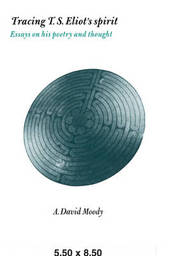
|
Tracing T. S. Eliot's Spirit: Essays on his Poetry and Thought
Paperback / softback
Main Details
| Title |
Tracing T. S. Eliot's Spirit: Essays on his Poetry and Thought
|
| Authors and Contributors |
By (author) A. David Moody
|
| Physical Properties |
| Format:Paperback / softback | | Pages:220 | | Dimensions(mm): Height 216,Width 138 |
|
| Category/Genre | Literary studies - from c 1900 -
Literary studies - poetry and poets |
|---|
| ISBN/Barcode |
9780521060967
|
| Classifications | Dewey:821.912 821.912 |
|---|
| Audience | | Professional & Vocational | |
|---|
| Illustrations |
Worked examples or Exercises
|
|
Publishing Details |
| Publisher |
Cambridge University Press
|
| Imprint |
Cambridge University Press
|
| Publication Date |
24 April 2008 |
| Publication Country |
United Kingdom
|
Description
T. S. Eliot's lifelong quest for a world of the spirit is the theme of this book by leading Eliot scholar A. David Moody. The first four essays in the collection map Eliot's spiritual geography: the American taproot of his poetry, his profound engagement with the philosophy and religion of India, his near and yet detached relations with England, and his problematic cultivation of a European mind. At the centre of the collection is a study of the Latin poem Pervigilium Veneris, a fragment of which figures enigmatically in the concluding lines of The Waste Land. The third part of the collection is a set of five investigations of Eliot's poems, dealing particularly with The Waste Land, Ash Wednesday and Four Quartets, and attending to how they express and shape what he called 'the deeper, unnamed feelings which form the substratum of our being'.
ReviewsFrom the hardback review: 'This new book by the author of the excellent Thomas Stearns Eliot: Poet is unusually well-written and wise. Its strengths lie in a sense of mature, richly informed, yet unpompous reflection on Eliot's poetry and construction of a poetic self. This tone of alert wisdom, rare in contemporary academic writing, makes the book one which is likely to be helpful and appealing to students, and enjoyed by Eliot scholars.' Robert Crawford
|